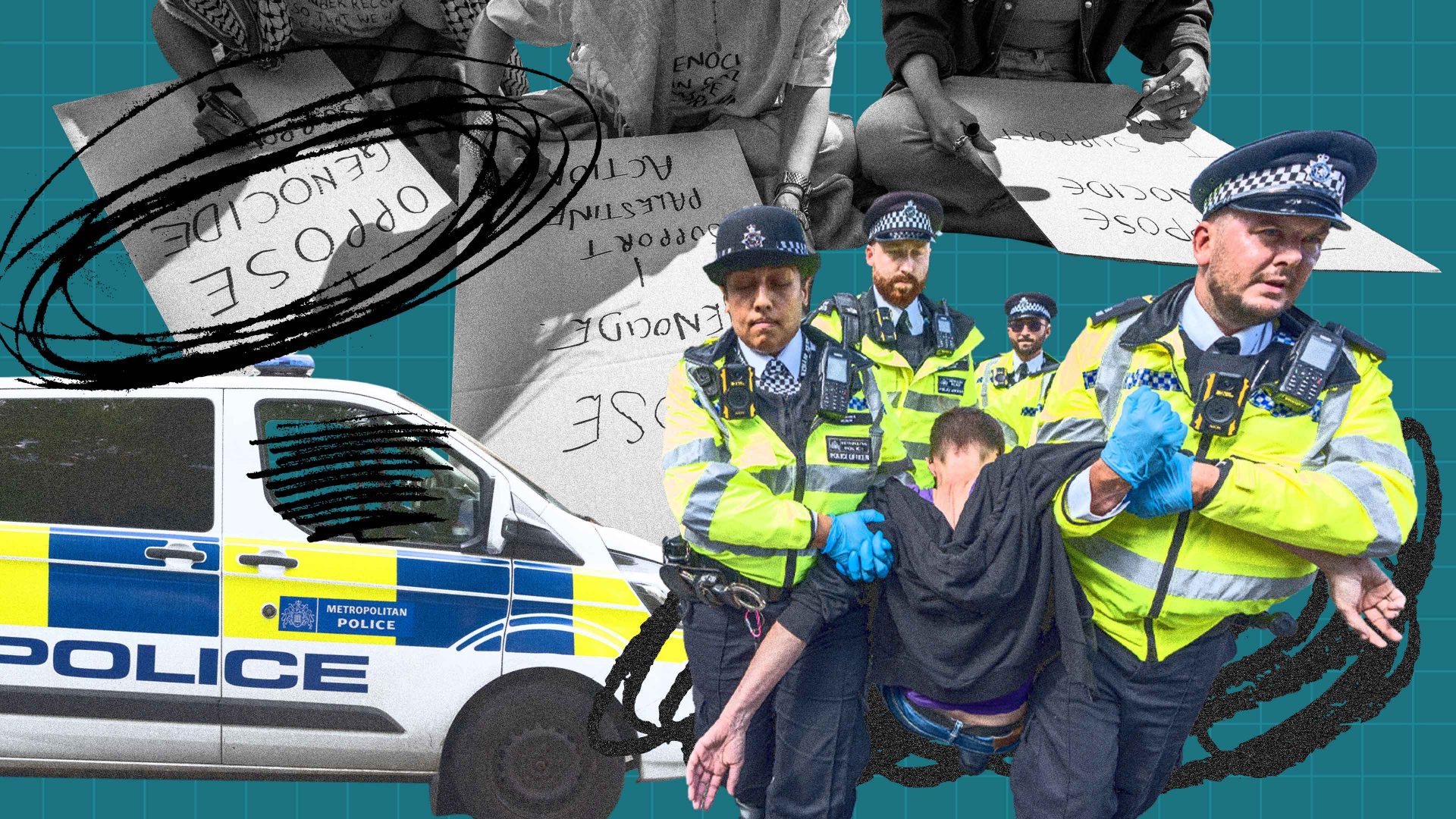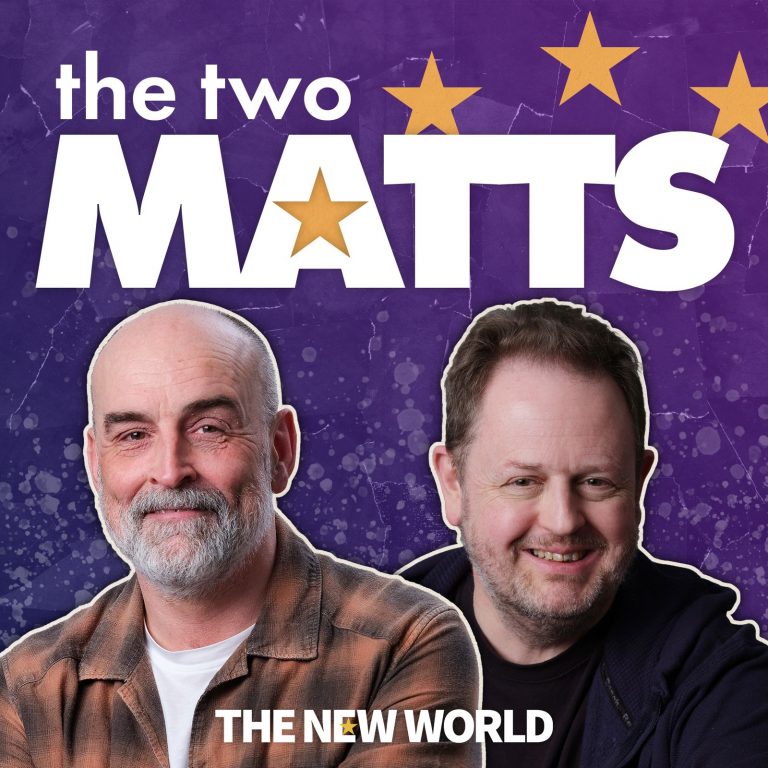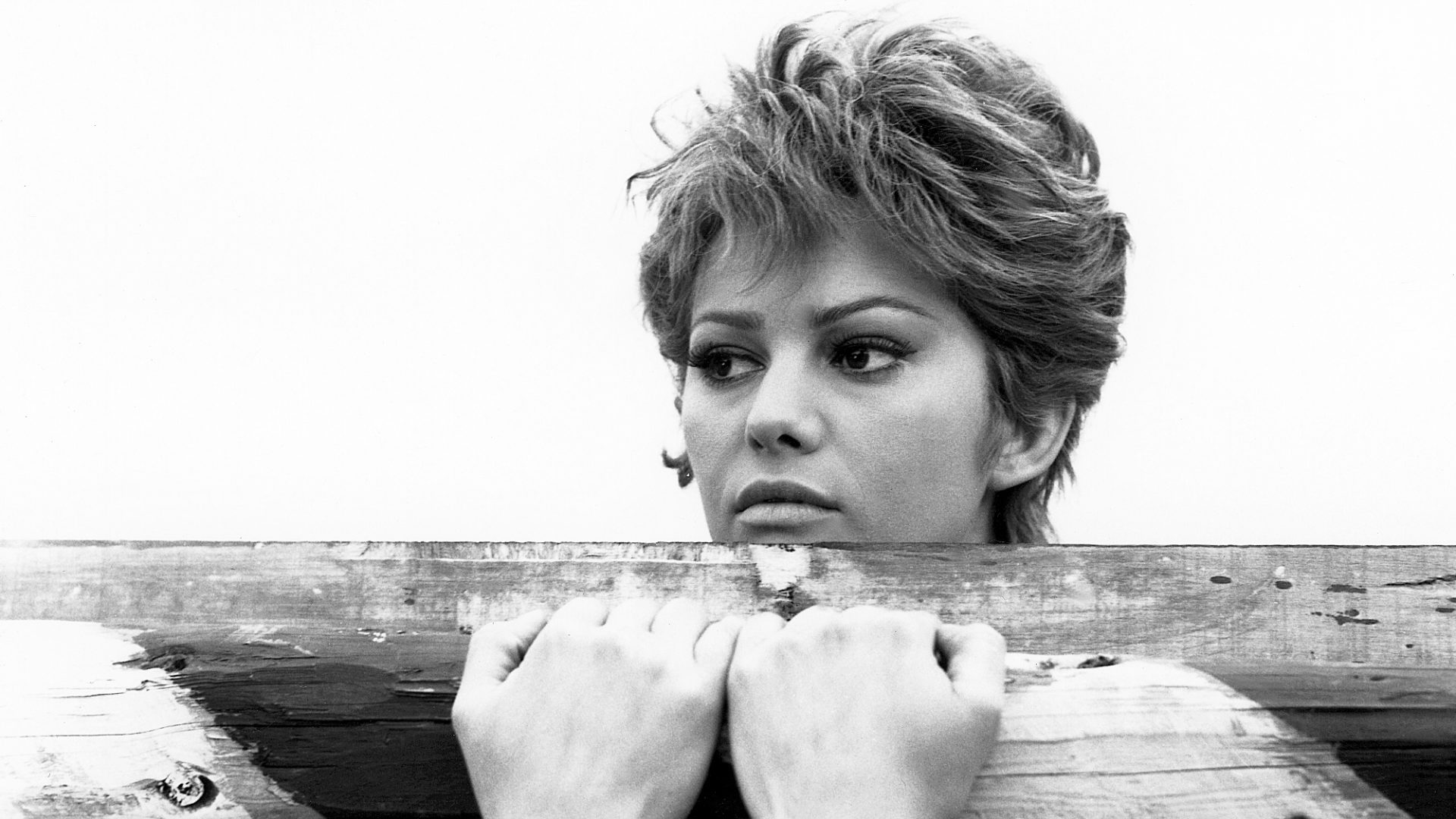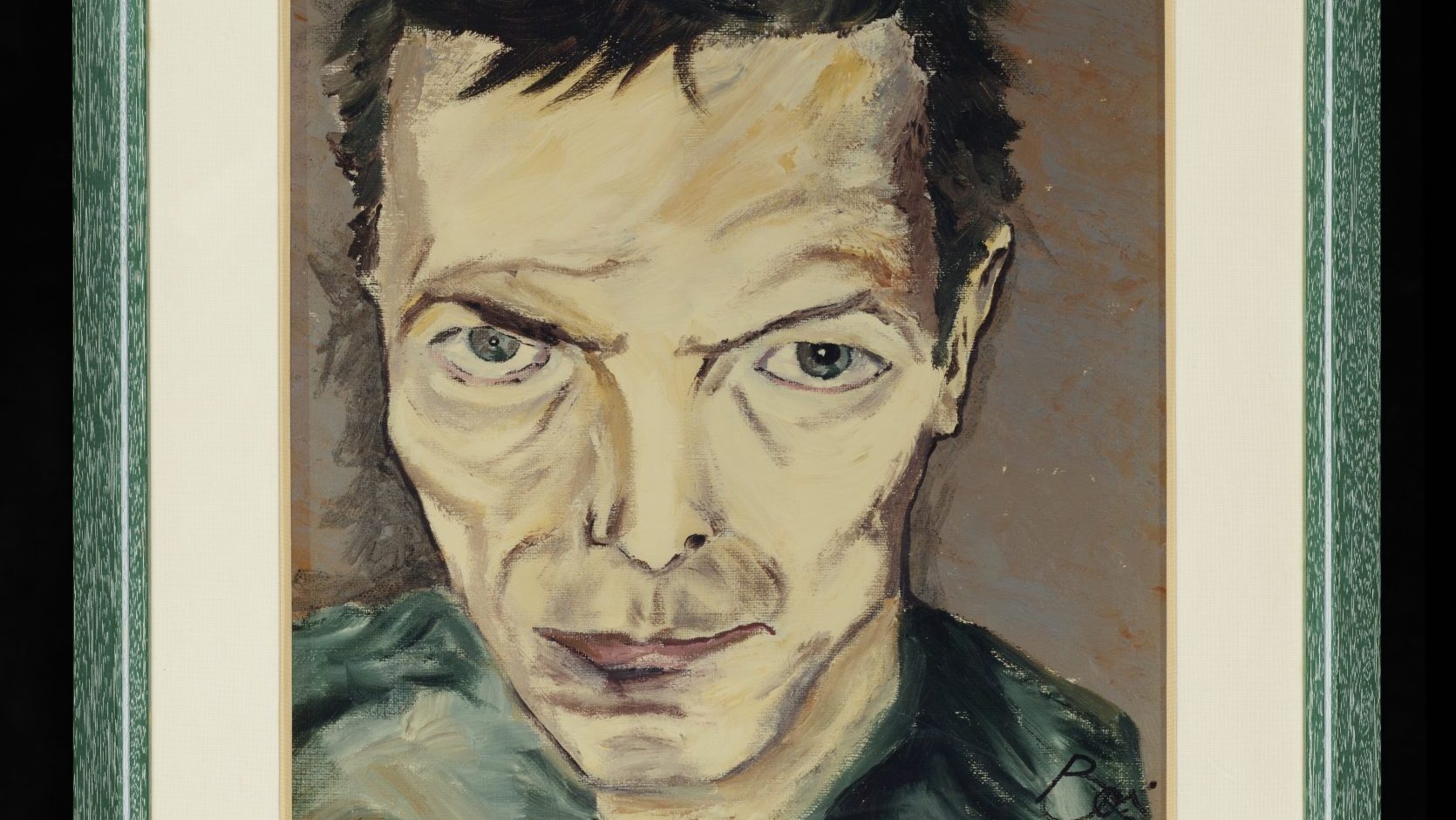“Frances I just had to congratulate you on getting arrested. Well done you.”
It was a message from a friend. We used to take our daughters to orchestra practice – and now she was congratulating me for being arrested. I was also congratulated by my daughter when I was released on bail on Saturday September 6 from Hounslow Police station. It happened like this:
I got to Parliament Green with 10 minutes to spare, ready for the protest that was scheduled to start at 1pm, and sat down on the worn grass next to a group writing out their placards: “I oppose Genocide. I support Palestine Action”. Palestine Action is a group that characterises its actions as “genocide preventative” and for the prevention of British war crimes, but was proscribed as a terrorist group by Yvette Cooper after breaking into RAF Brize Norton and spraying red paint on two aircraft.
The RAF has provided surveillance flights over Gaza for the Israeli Defence Force that have coincided with the Israeli military killing Palestinian civilians, such as their raid in April 2024 on the Nusreirat refugee camp, when 370 people were killed. In the fortnight before, the RAF had flown 24 missions over it. Britain also sends munitions, including bombs, mines and missiles to Israel and refuels US and Israeli fighter jets.
On the other side of the green was a counter-protest, advancing in a regimented formation, shouting and jabbing red placards in the air. I couldn’t see who they were. Their aggression was in stark contrast to the lowered heads of the sit-in. A guy whose placard looked like it was torn from a packing box, advised that it was best to write “genocide” across a single line.
With an excess of feeling I wrote my initial letters too big and had to squeeze the rest in at the end. A shy woman asked to sit next to me and started writing too. I had seen a video clip of an earlier protest in August, showing a genial looking man writing his sign as he chatted to his neighbouring protestors and snacked from a bag of nuts beside him, for all the world as if at a village fête or a school sports day.
But almost immediately there were black boots encircling me and high viz jackets towering above. A lady with chestnut hair came and sat crossed legged facing me and handed me a slip of paper which I now know is called a “bust slip”. Provided by Defend our Juries, on one side were instructions for how to keep your behaviour non-violent, on the other, dos and don’ts once in police custody, including advice not to use the duty solicitor but to ask for the Defend Our Jury’s Protest solicitor. The chestnut-haired lady told me I was doing really well. Having done nothing, I felt a fraud.
A female arresting officer knelt and went through the protocol; my cardboard sign and little bamboo stick were taken; my rucksack searched, (with book, pencil, snack, hoody, glasses, water flask). She told me one of my passion fruits had burst inside and I said yes, one was going off a bit. She found my phone in my skirt pocket – so stupid of me. I’d been told not to bring it and had forgotten. To my relief it was given back.
The shy lady turned her head as she was being handcuffed and between the black trousered legs and boots sought out my eyes – we exchanged a smile. As per our brief by Defend our Juries to keep our behaviour non-violent, I didn’t resist arrest but told the officer I would not get up and walk to the police van. We went back and forth, with me keeping my eyes down so as not to escalate the situation, culminating in me confirming that, “no” there was nothing they could do to persuade me to walk.
I don’t know how many police picked me up but as they started to carry me, I slipped from their arms and let myself fall on my front onto the grass. A young male officer asked if I would turn over, saying he was worried about my breathing, but I said I was fine. Supporters of the protest gathered shouting “shame on you” at the police. We are just doing our job, following orders, they replied.
“You should tell your sergeant you don’t want to do this,” a man told the police. “Children are being blown to pieces.” And he is correct. More than 62,000 people have been killed in Gaza, including over 20,000 children, and 174,000 people have been injured. This does not include the starvation, or the illness caused by the dirty and limited water available.
Meanwhile, this government has been dragged by public opinion to recognise Palestinian statehood, but it has not sanctioned or implemented a trade embargo to isolate Israel. Instead they have lashed out, designating a protest group as terrorists whose actions do not even come close to terrorism. It is a complete inversion of where the outrage should be.
The chestnut-haired lady sat in front of me again. After what felt like a long time, the police got more reinforcements (I think it is harder to carry someone face down) and I was transported off.
“I love you,” I heard the chestnut-haired lady say. I half raspberried, half laughed. But that night, finding it hard to sleep, her generosity came back to me, along with a history lesson about Horatio Nelson and the love and affection between his captains, who he called his “band of brothers”. If you are reading this: thank you, chestnut haired lady. Your warmth is still with me.
I slipped from the grasp of the police again and lay face down for a while on the street by the House of Lords. Liberally speckled with silvery grey gravel, (providing visual interest at close quarters), I’ve since learned that Westminster Council is a leader in using a high proportion of recycled asphalt on their roads, with a low carbon footprint, which is something positive. Eventually, I was put in a metal box-like space with a metal seat in the back of a police van. I took my phone out and messaged my daughter, but my arresting officer spotted this through the small glass squares, opened the door and snatched it from me.
We were then driven with some other arrestees to what, I think, was a closed off part of Millbank. Plane trees lined each side of the road, peaceful in the September sunlight, and in the middle was a long line of portable gazebos with tables, where plainclothes police sat behind laptops. I was asked to give my name and address but following the guidance on my bust slip I said I would only give that at a police custody reception, (thus hopefully slowing the whole process down and swamping the system.)
My arresting officer gave my name off my bank card from my wallet – again, stupid of me to have brought it. After peering at his screen for a while the data police guy said he couldn’t identify me, and I was told to sit on a chair on the pavement. My arresting officer said she had a bad back, so I agreed to walk.
Lying flat on the pavement was a young man who was evidently stronger in his resolve not to comply. There was also an arty looking lady, my age, sitting on a chair and another lady in green. We watched what looked like a young Palestinian man being led along in handcuffs to be seated further away. He looked vulnerable on his own. They put him in a van soon after. An extremely old-looking lady was led along, barely able to walk, with the police carrying a camping chair next to her. Every few yards she stopped and slowly lowered herself into the chair.
“How can you call her a terrorist?” I asked the assortment of police around us.
“She is supporting a terrorist organisation,” a young policewoman replied.
“It is a peaceful organisation drawing attention to our government’s involvement in genocide,” the lady in green, whose name I now know is Rachel, said. “She is peacefully campaigning for the ban on Palestine Action to be lifted.”
But her words got lost as the young police officer complained that we were wasting police time. A guy with shoulder length hair, with “Plasticine Action” written across his t-shirt was led towards a van, followed by a haphazard police escort of a disabled person in their electric buggy, who shot zigzagging at erratic speeds along the road, followed by a second disabled person in another stop-start buggy and their escort. For a moment I thought the police would give up the farce.
The young man who had been lying on the pavement sat up crossed legged. I told him how brave I thought he was, having so much more to lose than us oldies. Rachel pointed out a special police van parked at the end of the road which had towed a concertina of metal panels that formed a high wall, thus cordoning off the road.
And then a bearded man with a large belly was carried and put down on his back by the pavement, where the road surface curved into a gutter. He propped himself up on his elbow and started to explain to the police that he had Long Covid, that he had to conserve his energy, which is why he was continuing to lie down. The police made embarrassed noises as he went into detail about Long Covid.
“I will not resist, but I will not assist you,” the young man said with lowered eyes in an uncertain voice as four police came to carry him off. They opened a join in the metal panelled wall, and he disappeared into what we assumed was a waiting van outside.
Then it was our turn. I was put back into a metal box at the back of a van. Rachel and the arty looking woman were put in seats at the front along with our arresting officers. I could see them through the small squares of glass. We sat for about an hour at the side of the road. And then began what felt to me like a long journey to Hounslow. I went through my memorised verses of the Ancient Mariner to keep the claustrophobia and car sickness at bay, interspersed with studying my Bust Slip.
It was 5.30 when we were presented to the custody desk. I gave my name and date of birth. Unnervingly, the custody officer immediately found my address. On either side of me, Rachel and the arty looking lady, who by then I knew was called Mary, were also being processed. My arresting officer went through my bag again. I was not allowed to take out my hoody or have the pumpkin seeds I had in a side pocket. Grudgingly I was allowed to have my glasses, the passion fruit and the water from my flask, but my arresting officer had to pour it into a cup first.
An officer dialled the one phone call you are allowed to the Back office of CASP, (Climate Action Support Pathway) which for this purpose had teamed up with Defend Our Juries. I was given a leaflet headed “Rights while detained”, and taken to a room to be fingerprinted. I wasn’t allowed my book or pencil from my bag, but I was allowed to select a book from an assortment on a shelf and then taken to a cream tiled cell.
In one corner was a metal toilet, with a little wall, in theory shielding you from the ball-shaped camera above the door. Along the far wall was an artificial stone bench with a padded plastic cushion the length of a short person and a “blanket” of some stiff fibre. The artificial light was very bright, but it was clean. I started to read the book – the opening scene was an operation to take out a bullet lodged in a woman’s skull. I didn’t look at the title but now I know it was The Girl who Kicked the Hornet’s Nest, by Stieg Larson, a lucky choice. It is gripping.
Suggested Reading
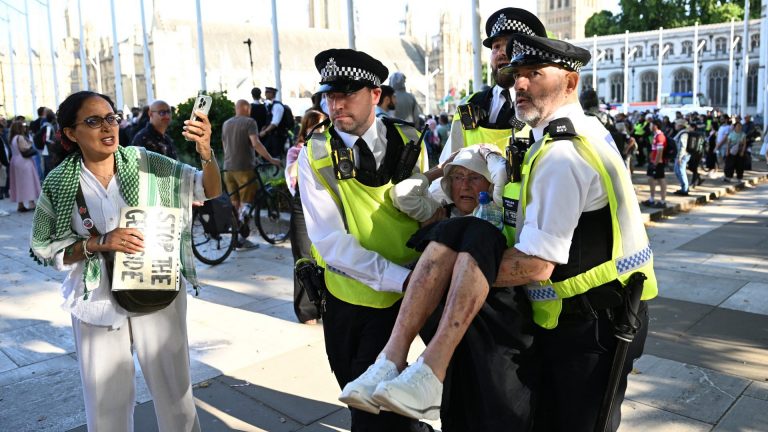

The government has lost the argument on Palestine Action
Re-reading the leaflet on my rights, I calculated that I could be kept for 24 hours. But how could the protest solicitors get to all of us that evening? Maybe 36 hours then. I had a booming headache, was hungry and cold. I folded the blanket into a yoga mat, put it on the floor and did some exercises to warm up. Yvette Cooper’s face came to mind. I had been a fan of her and Starmer. Why had she proscribed Palestine Action by using the UK Terrorism Act of 2000, which defines terrorism as including serious damage to property, but which is not in line with the norms and standards of International Law?
Doesn’t the disproportion of the proscription betray her and her government’s guilt for being complicit in Israel’s atrocities in Gaza – the actual terrorism? And given she is so convinced Palestine Action is a violent organisation in intent, as she has said in the media, why does she not make the evidence public?
Two or three times the letter box flap in the door was opened and a pair of eyes looked in. I sat on the padded mat, stretched, wrapped myself in the blanket and read a bit more of the novel. The second chapter begins with a character repeatedly saying “idiot” of the police who have named the woman with a bullet in her head as a triple murderer, when in fact she is the victim. The letter flap was opened again, then, to my amazement, the door opened, and an officer told me I had been granted bail.
Back at the custody desk, I had to sign the bail conditions to “surrender” to custody at Hounslow station in November and not to protest on behalf of Palestine Action again. I asked what would happen if I did and was told that I would not be trusted to be bailed again. My bag was given back to me, I put on my hoody, was taken through some glass doors and saw my daughter. She’d tracked me down through Defend our Juries, who had logged my call to the back office of CASP. Rachel and Mary were there and two supporters from CASP to help us, if needed, to get home. We discussed that maybe we should have refused bail and insisted on seeing a Defend our Juries designated solicitor.
“God I just wish they would stop the killing and starvation,” another friend said the next day, after congratulating me for being arrested.
More than 2,000 Palestinians have been shot dead trying to get food, mostly at Gaza Humanitarian Foundation (GHF) “aid” sites as witnessed by whistleblowers. Since October 2023, 245 journalists have been killed. According to UN figures, the total number of healthcare workers who have lost their lives in military attacks since October 2023 is 1,400 and 492 doctors have been killed. All of these people were targeted with sophisticated weaponry and intelligence.
All of the directors of the hospitals in northern Gaza have either been killed or detained by the Israeli military. Hundreds more healthcare workers from Gaza are in Israeli detention, where they have reported being tortured, surgeons released with hands mutilated. But these are the “lucky” ones. Dr Adnan Al-Bursh was head of orthopaedics at Al-Shifa hospital, and was arrested. According to witnesses and the UN Special Rapporteur on the Palestinian occupied territories, he was tortured to death and suffered severe sexual violence in the hours before his death.
As Defend our Juries has written, one may have disagreed with the tactics of the suffragettes who damaged property as part of their protest methodology, but it would have been absurd to make it a serious crime to express support for the Suffragettes. It is no different with Palestine Action.
In the US, posting on his Truth Social platform, after the killing of Charlie Kirk, Trump announced plans to designate the left-wing activist group Antifa (short for anti-fascist) a terrorist organisation. This followed Stephen Miller, the White House deputy chief of staff saying the administration planned to dismantle “a vast domestic terror group”, which he claimed had somehow caused Kirk’s assassination, though investigators have yet to provide a motive for the murder.
The UK government needs to review and revise its counter terrorism law, particularly its definition of terrorism, to confine it, in line with international democratic norms, to acts intended to cause death or serious injury or to the taking of hostages for the purpose of intimidating a population or government.
Because if we can’t speak out about genocide in which the government is an active partner, and in support of those resisting genocide, our right to freedom of expression and peaceful assembly has been stripped away. When that goes, our democracy is lost.
Frances Kelly has edited, written and directed drama for TV, and has written for the Telegraph and The Article

